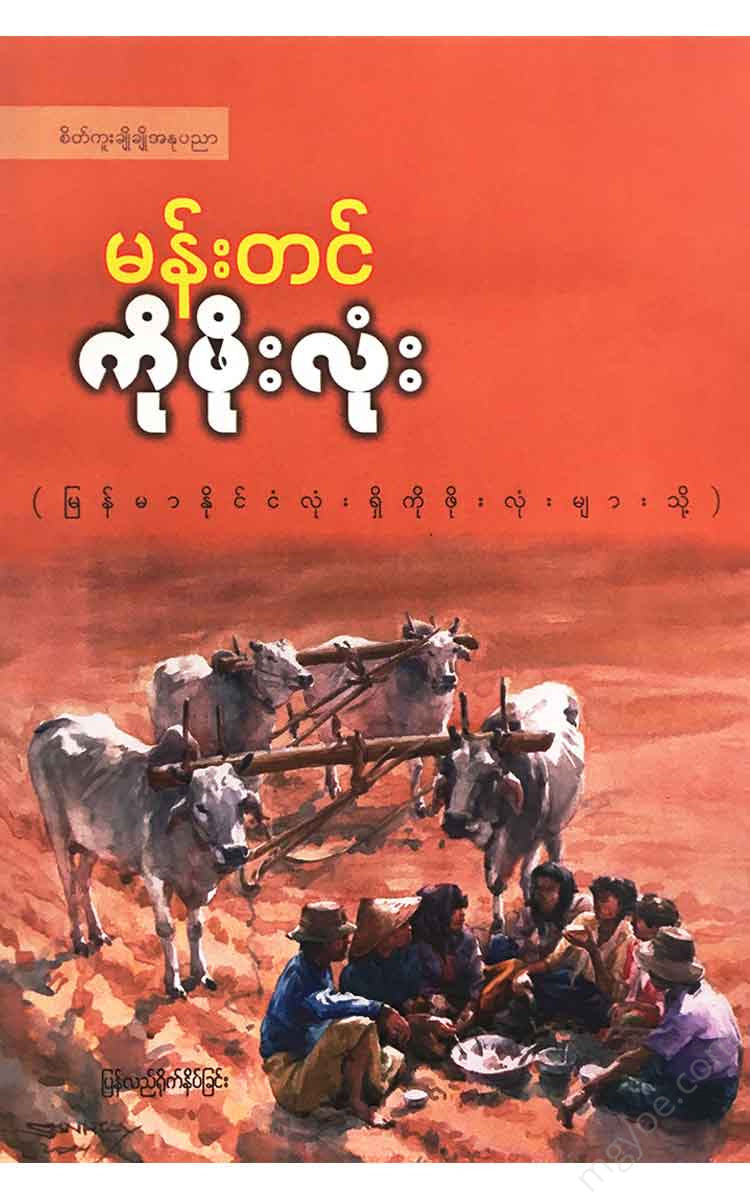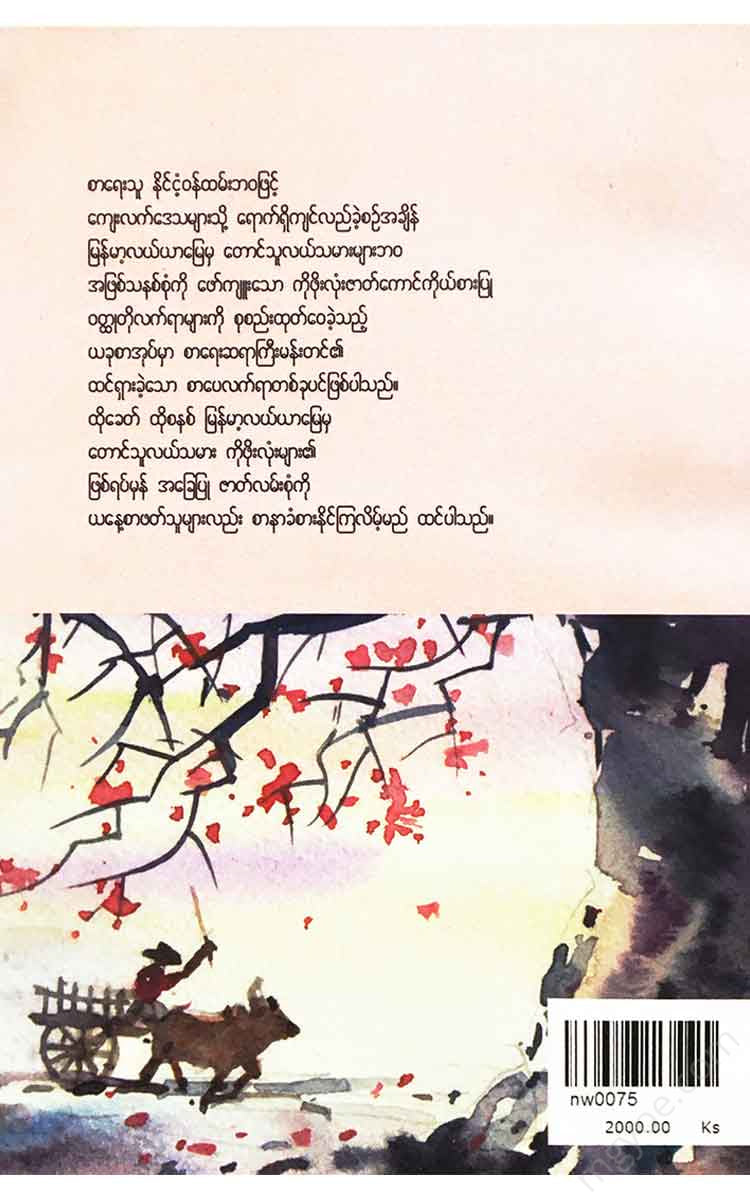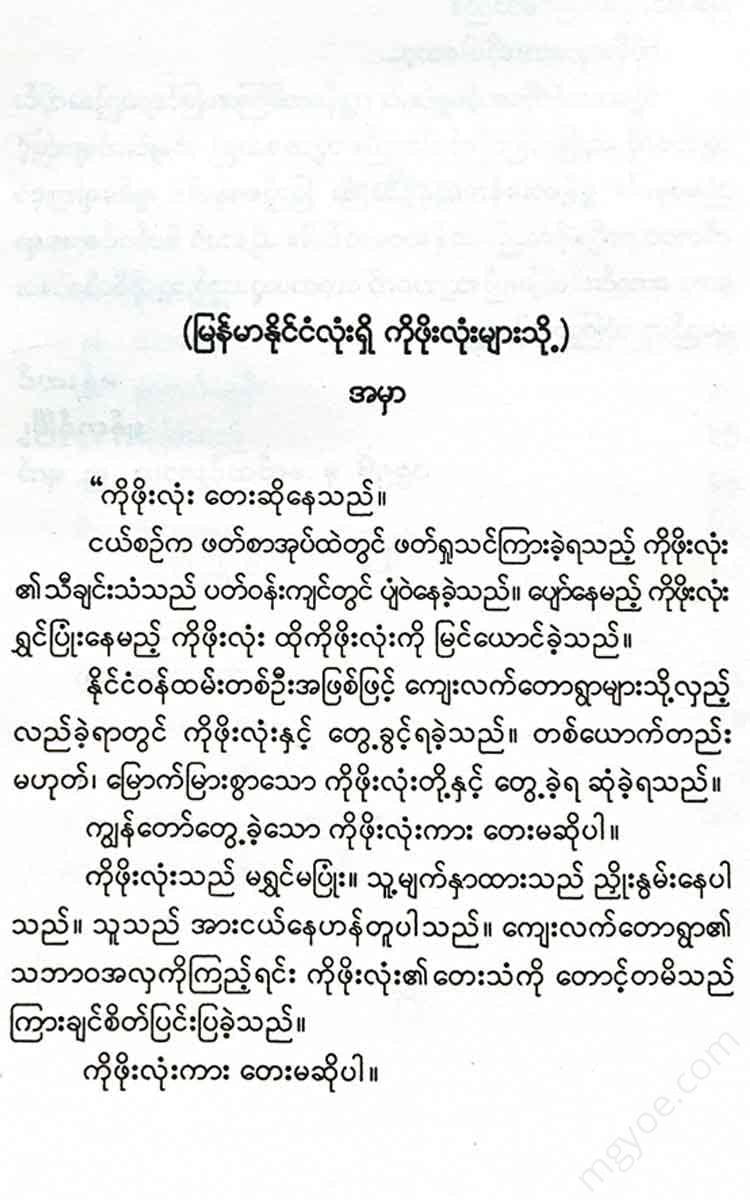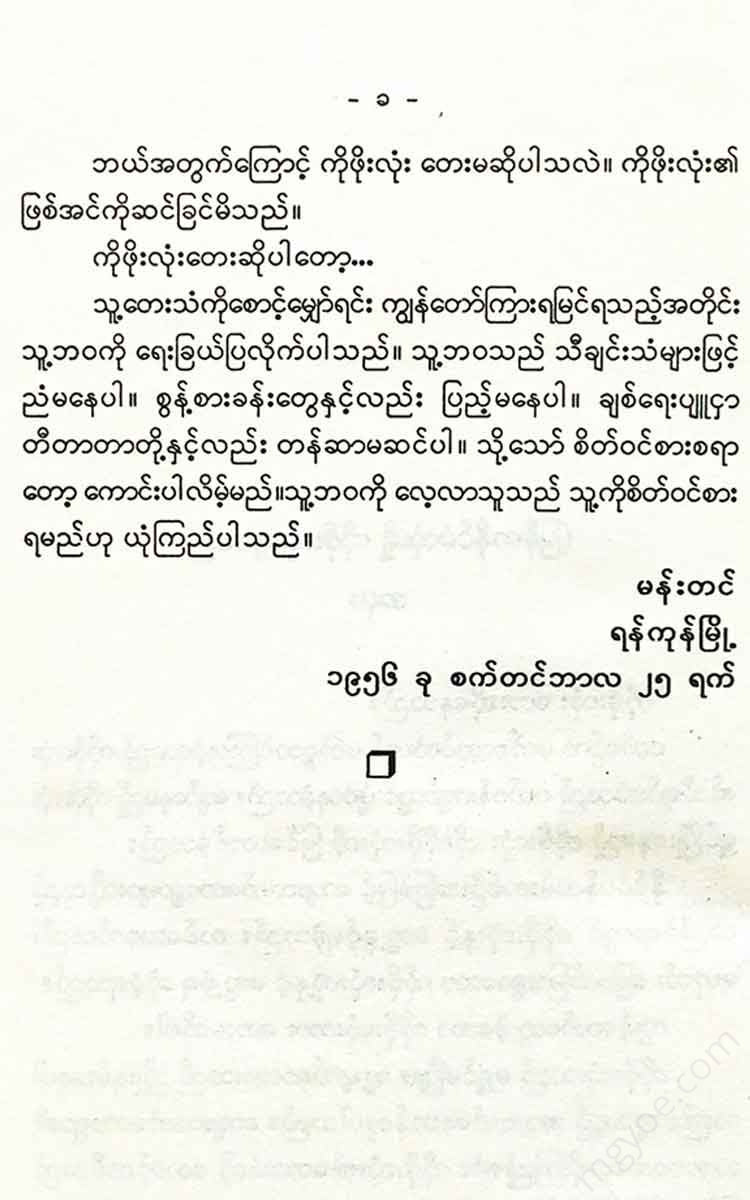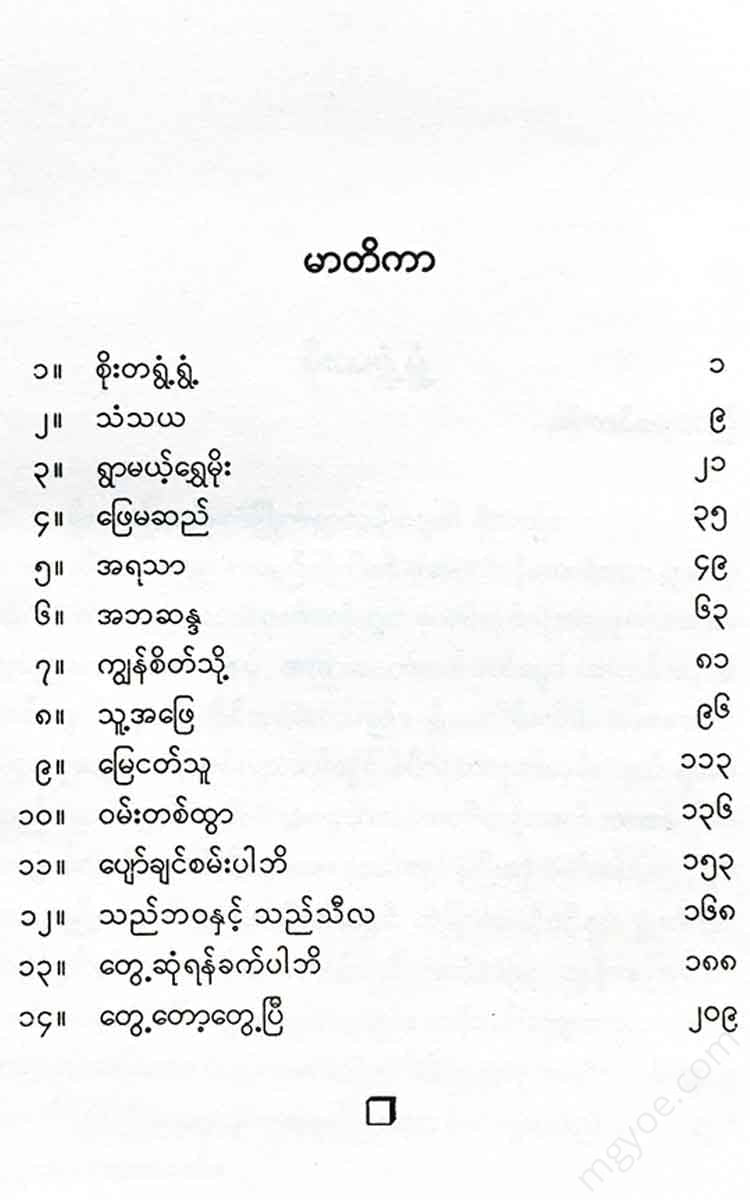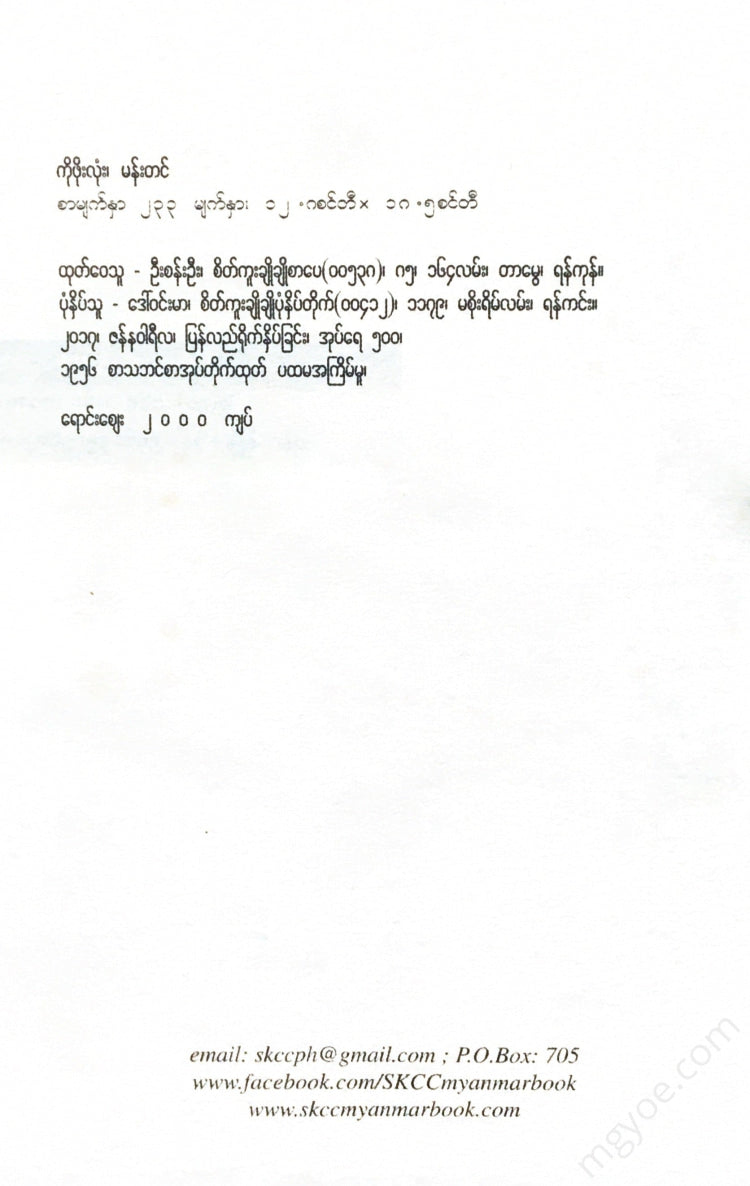စိတ်ကူးချိုချိုစာပေ
Mann Tin - Ko Pho Lone
Mann Tin - Ko Pho Lone
Couldn't load pickup availability
Fearful, fearful
The rain is pouring down.
Ko Phoe Lone, wearing a short robe and a helmet, left the village. In one hand he carried a sack of coarse cloth containing two bottles and in the other a bamboo stick. His feet, covered with mud, shuffled slowly over the stilts. As he left the village, he could see vast fields stretching out to the eastern mountains. In each field, he could see farmers, their feet covered in mud, slouching behind their plows. Smoke billowed from the thatched roofs of the farmers’ huts, which had been built at the corners of the stilts.
Ko Phoe Lone, enjoying the view, suddenly checked his bag. He was not satisfied with the check. He opened the pocket of his shirt and looked. He felt relieved when he saw a brand new ten-tong bill and five one-kyat bills. He had brought fifteen kyats out of the sixty pieces of gold.
“Buy only what you need, Ko Po. Don’t buy anything extra. You won’t have to pay for the rice planting.”
The wife pretended to listen to Mae Shwe's warning. The seedlings were also thriving. In about ten days, the entire ten acres would be planted. By the time the month of Tanaungmone arrived, she would see a large field full of fruits. If the work for the field had been completed, she would have about four hundred tons of paddy in her hands. If she sold the paddy at three hundred tons, like last year, she would have about two hundred thousand shillings left. Then she would be able to take care of her beloved son. He imagined people baking bread, people carrying offerings, and monks carrying large shillings in procession. He also imagined the sound of drums.
The rain has stopped.. The sun is already high, about a palm tree high.
Ko Phoe Lone left the city carrying two bottles on one side of the bamboo stick he had brought with him, and a cloth bag on the other. He had put sauce in one bottle and oil in the other. Inside the cloth bag were chilies, beans, salt, turmeric, and other spices.
His legs were not as agile as when he came, they were walking slowly. His head was drooping. He was thinking.
"Freedom... freedom"
In the tea shop near the Chinese shop where he had bought his groceries, he heard a Japanese-era criminal with a large newspaper in his hand, talking to him. Ko Phoe Lone remembered him well. He had once arrested Ko Phoe Lone as a suspect in a theft during the Japanese era. He had once shouted, “You are my brother,” and punched him.
"You are a thief."
I was hit with a gun butt.
"Your mother," he murmured, pouring water into his nose.
How could Ko Po Lone forget him?
Now he's in a tea shop, holding a large newspaper and preaching independence.
"Considering the circumstances, our country must gain independence. If we don't, we must gain it."
I heard those words from that great person. They were words that stuck in Ko Phoe Lone's ears. Ko Phoe Lone could see how passionate that great person was for independence. Every time I saw his enthusiasm, every time I saw (or thought about) his enthusiasm, Ko Phoe Lone felt goosebumps. He was sweating profusely. He was relishing the taste of independence that he had enjoyed during the Japanese era.
He still remembers. When he heard that the British had fled, he overthrew the old chief in the village and established the “Independent Burma Government,” and Thakin Tok Pao became the administrator. When independence was achieved, he was summoned and given five lashes for not coming to the king immediately. This was Ko Phoe Lone’s first taste of independence.
Soon the governor was overthrown and the chieftain returned to his office. At that time, large posters were seen plastered all over the walls of the chieftain's house, saying, "One blood, one voice, one command." The village chiefs and civil servants shouted, "We must fight for independence by burning houses, burning cattle, burning people," while listening to the slogans of Ko Phoe Lone and his group of masters, who were helping to cut wood and fetch water. That was not all. They were also forced into labor camps.
When Ko Phoe Lone heard the news that independence was about to be declared, he was overjoyed. “On the day of the declaration of independence, all the people in the village must be killed,” Ko Phoe Lone’s group joined the Oh Si Waing. At that time, they were so happy that they joined the Oh Si Waing and danced until they were completely naked.
“Now... we have independence, we must work hard and do our jobs.” Two or three days after the declaration of independence, Japanese military officers Ko Phoe Lone arrived in the village and began to work as laborers in the fields where Daw and Maw were taught. The remaining women, men, and children in the village were forced to go down to the airfield to work. They also had to go out into the forest to collect firewood for the railway. They also had to make straw bags for every house.
The slogan "Independence must be tied to blood" made the villagers join the army. They took up arms and went out to the battlefield. On the battlefield, many of their blood-stained bodies were sacrificed on the altar of independence. Meanwhile, the Japanese masters, shouting "He Ho Ta", also dragged young people from all over the village.
Ko Phoe Lone tasted the taste of freedom all the way. Ko Phoe Lone had been to the labor camp during independence. He had also worked as a firewood cutter. He had also worked as a mat weaver, an aircraft carrier, and many other jobs. He also remembered that once, when he was sick and could not go to the airfield, a Japanese man with torn pants came to his house in anger. He had been pleading and pleading and had been slapped on the cheek. When the old man spoke up for himself, he also gave him a couple of bites of freedom. As he walked, he felt his cheek. "Hmm," he sighed.
When independence was achieved, Ko Phoe Lone's field was covered with tall grass and turned into a forest. The golden rice that Ko Phoe Lone loved so much was scattered in the village, and he was reduced to a worthless life. Ko Phoe Lone, who was only working for independence, could not look back at his field. He did not want to look back. He remembered once when he was forced to work as a laborer while plowing the field.
She looked at the long-sleeved shirt and the linen shirt she was wearing. She thought back to how her wife, Mae Shwe, had been afraid to leave her house after independence. She also imagined how her sister had always been in a turban. She could not forget how she had to bribe the three hundred baht she had saved to buy a long-sleeved shirt to be taken to a labor camp.
There were people who were more virtuous than him. A Karen old man near his house was captured by the Japanese during the independence. The reason for the capture was said to be that his son had joined the British army. He returned after a month. When he heard him say this, he sighed, “Oh, we have good deeds.” He burst into tears and said, “Isn’t your son coming back?” The Japanese asked him if he had. He poured hot water into his nose. He cut off his nails. He rolled his feet with a stick. He tied his hands and feet with rope and tied them together. Ko Phoe Lone felt sick to his stomach every time he thought about it.
“Freedom.” Did Ko Phoe Lone ever fully experience the joy and happiness of those three words? Ko Phoe Lone came into this world as a slave. The only taste of freedom he had ever tasted was the freedom he had been forced to experience four years ago. Whenever he heard the three words “freedom,” Ko Phoe Lone imagined the riches he had once experienced.
They were tortured, flogged, forced into labor camps, bombed, machine-gunned, disease spread, fields were destroyed, rice prices fell, other goods rose, a piece of cotton cost four to five hundred won, hot water was poured down their noses, nails were pulled out, and they were slapped repeatedly.
Ko Phoe Lone felt sick to his stomach every time he thought about it. He started sweating profusely. His chest was trembling.
As he walked, thinking, he met the farmer leader from his village, who was standing with him.
“Oh, Ko Phoe Lone, haven’t you joined our farmers’ organization yet?”
When Ko Gi asked, "Yes, I'm coming in..." Ko Phoe Lone replied. Ko Phoe Lone's chest was still trembling, and he was still sweating. Ko Gi remembered him after he passed by, and turned back.
"Only..."
The only one who turned back.
"If only we could gain independence... right?" "Yes, of course."
"when"
"I need three or four months"
Ko Phoe Lone couldn't say goodbye to Ko Giko anymore, so he turned around and started to walk away.
When he reached the door, he lowered his staff.
"You're not free yet."
As he said this, tears began to fall.
